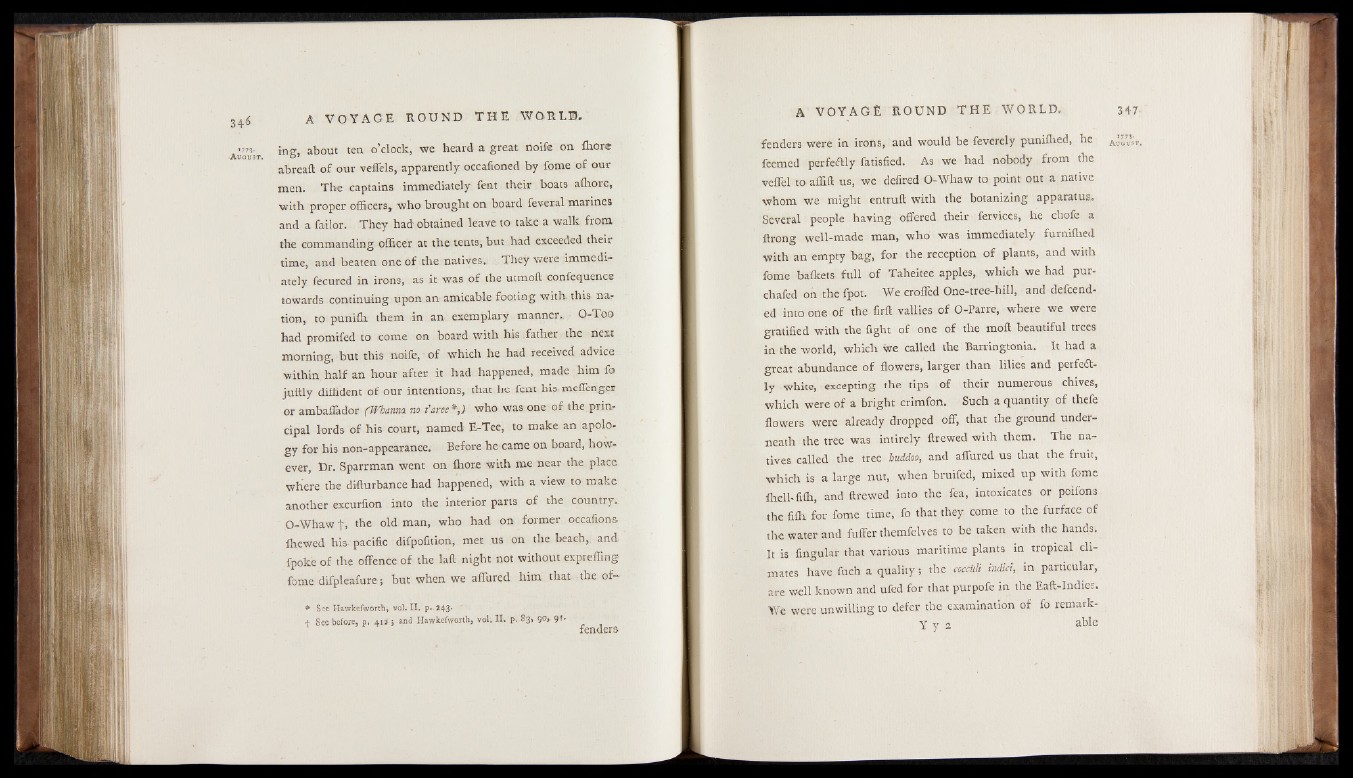
3 4 ^
*7n- ins', about ten o'clock, we beard a great noife on fliore
-August. o *
abreaft of our veflels, apparently occafioned by fome of our
men. The captains immediately fent their boats alhore,
with proper officers, who brought on board feveral marines
and a failor. They had- obtained leave to take a walk from
the commanding officer at the tents, but had exceeded their
time, and beaten one of the natives. They were immediately
fecu-red in irons, as it was of the utmost confequence
towards continuing upon an amicable footing with this, na.
tion, to puniffi them in an exemplary manner.. O-Too
had promifed to come on board with his .father the next
morning, but this noife, of which he had received advice
within half an hour after it had happened, made him fa
juftly diffident of our intentions, that he fent his meflenger
or ambaflador (.Wbaima. no t’aree *,) who was one of the principal
lords of his court, named E-Tee, to make an apology
for his non-appearance. Before he came on board, however,
Dr. Sparrman went on ffiore with me near the place
where the difturbance had happened, with a view to make
another excurfion into the interior parts of the country.
O-Whaw f , the old man, who had on former occafions
ffiewed his pacific difpofition, met us on the beach,, and.
fpoke of the offence of the laft night not without expreffing
fome difpleafure; but when we affined him that the of-
* See Hawkefworth, vol. II. p. 243*
4 See before, p. 41 a ; and Hawkefworth, vol, II. p. 83) 90, 9 1 .
fenders
fenders were in irons, and would be feverely puniffied, A ugust.
feemed perfectly fatisfied. As we had nobody from the
veffel to affift us, we defired O-Whaw to point out a native
whom we might entruft with the botanizing apparatus.
Several people having offered their fervices, he chofe a
ftrong well-made man, who was immediately furniffied
with an empty bag, for the reception of plants, and with
fome balkets full of Taheitee apples, which we had pur-
chafed on the fpot. We croffed One-tree-hill, and defcend-
ed into one of the firft vallies of O-Parre, where we were
gratified with the fight of one of the moft beautiful trees
in the world, which we called the Barringtonia. It had a
great abundance of flowers, larger than lilies and perfectly
white, excepting the tips of their numerous chives,
which were of a bright crimfon. Such a quantity of thefe
flowers were already dropped off, that the ground underneath
the tree was intirely ftrewed with them. The natives
called the tree huddoo, and affured us that the fruit,
which is a large nut, when bruifed, mixed up with fome
Ihelbfiffi, and ftrewed into the fea, intoxicates or poifons
the fiffi for fome time, fo that they come to the furface of
the water and fuffer themfelves to be taken with the hands.
It is Angular that various maritime plants in tropical climates
have fuch a quality; the coccuti indici, in particular,
are well known and ufed for that purpofe in the Eaft-Indies.
We were unwilling to defer the examination of fo remark-
Y y 2 dblc